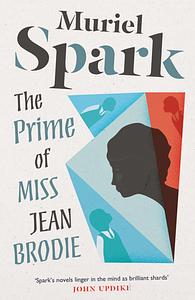You need to sign in or sign up before continuing.
Take a photo of a barcode or cover
funny
lighthearted
reflective
medium-paced
Plot or Character Driven:
Character
Strong character development:
Complicated
Loveable characters:
Yes
Diverse cast of characters:
No
Flaws of characters a main focus:
Yes
Laughed out loud several times!
Not my cup of tea. I couldn't find a way to be invested in Miss Brodie as a character and I was unconvinced of the girls' relationship to her.
hopeful
inspiring
reflective
fast-paced
Plot or Character Driven:
Character
Strong character development:
Yes
Loveable characters:
Complicated
Diverse cast of characters:
N/A
Flaws of characters a main focus:
Complicated
As someone who loves Edinburgh and novels set In academic settings, this was everything. Let's just say Mr keating and Miss Brodie would get on well.
medium-paced
reflective
medium-paced
Plot or Character Driven:
Character
Strong character development:
Complicated
Loveable characters:
Complicated
Diverse cast of characters:
No
Flaws of characters a main focus:
Yes
Jean Brodie is a teacher at a girls' school in 1930s Edinburgh, Scotland. Among her students are six girls - Sandy, Jenny, Monica, Rose, Eunice, and Mary - who quickly become known as “the Brodie set.” Despite teaching many others, Miss Brodie singles them out as her “crème de la crème,” bestowing privileges and outings upon them to secure their loyalty. Rather than choosing the girls for their talents, she seems to select them based on a mixture of charm, susceptibility, and lack of parental interference. She assigns each girl an often inappropriate or reductive defining trait - Rose is associated with sex, Sandy with insight, Mary with stupidity, etc. These labels become self-fulfilling over time, shaping how the girls treat one another. For instance, because Miss Brodie deems Mary foolish and blames her for nearly everything that goes wrong, the other girls mimic her treatment of Mary - something many come to regret in adulthood.
The novel follows the Brodie set from their junior school days through adolescence, occasionally glimpsing their futures as adults. The Headmistress, wary of Miss Brodie’s unorthodox methods, repeatedly tries to find grounds for her dismissal. Aware of this, Miss Brodie warns her girls that she is under siege and urges them never to betray her. Out of loyalty - or perhaps fear of alienation - they stay silent.
Miss Brodie’s manipulative power is a central focus throughout the short novel. She discourages teamwork and school spirit, seeing them as beneath her elite group. She disregards the curriculum in favor of talking about herself - her European travels, her romantic entanglements, and, disturbingly, her admiration for fascist leaders like Mussolini and Hitler. This romanticizing of the heinous and powerful is a recurring theme. Her desire for control becomes darker as the girls grow older, going so far as to encourage a fifteen-year-old Rose to enter into a sexual relationship with the married art teacher, Mr. Lloyd, with whom Miss Brodie herself is infatuated. This act of grooming and sexual manipulation of a child is presented in a disturbingly casual manner, as though it were merely another of her eccentric plans rather than a serious ethical breach.
This is where my feelings about the novel become complicated. Muriel Spark is known for her irony and satirical detachment; she intentionally presents her characters in an ambiguous light rather than spelling out their transgressions. In many ways, this is clever, and I am likely feeling its intended effect. There are no screaming matches, no climactic reckonings, and no one ever states outright that Miss Brodie is predatory or morally bankrupt. Instead, conversations, whether about fascism or teacher-student affairs, are treated with the same polite composure as a discussion over afternoon tea. This lack of reaction to something that would be considered criminal in the modern era is why I am unfulfilled by the narrative.
In the end, I’m left conflicted about The Prime of Miss Jean Brodie. It is unquestionably well written, and the early scenes of the girls romanticizing their teacher's exploits and discussing literature are genuinely charming. But the understated treatment of the novel’s more disturbing elements - particularly Brodie’s political beliefs and her manipulation of young girls - leaves an unsettling impression. Ultimately, it’s a sharp subversion of expectations and a clever satire, but not one I would enthusiastically recommend to every reader.
Graphic: Toxic friendship
Moderate: Adult/minor relationship
Minor: Body shaming, Bullying, Sexual content
I have a penchant for novels surrounding the issue of the teacher student relationship— especially if the teacher turns out to be flawed in some (or many) aspects. Some other titles from this area that I have enjoyed include Ishiguro’s An Artist of the Floating World, Isherwood’s A Single Man, and Tartt’s The Secret History. The latter, especially, is comparable to this text in several ways. Literally in that both the Brodie set and the Classics class complete with their teachers the Seven of Perfection. More abstractly as the Bacchanalian rituals the Classics students engage in— and some suspect Julian was far earlier privy to— parallel the sexual dynamics between Jean Brodie and her set. As Sandy remarks, she is some kind of sapphic, seeking pleasure in the sexual conquests of her girls. Both her and Julian have a star student— she Sandy, he Henry— that “goes too far”, in that Henry enacts Julian’s teachings so literally it leads to death, in that Sandy too assimilates Brodie’s teachings against team spirit to such an extent that she “betrays” her without a care.
Like with the last Spark I read, I finished this immediately feeling like I wanted to re-read, to write literary analysis. If I was to, I would write on Miss Brodie’s sexuality— outside of her relationship to Rose and Sandy, who as I have aforementioned, she enjoys sexual conquests through, extending the prime that must expire— surrounding the music teacher. Her “fattening” of him is intriguing, it is a form of control like that she exerts on her students, and is simultaneously why they cannot see him and her engaged in intercourse— that he is so short and stout, and she so tall and thin— she is making him somewhat repealing, even to herself. It is the only way to regain control after the renunciation of the art teacher, who she knows she controls more through the students.
I would also write about Sandy’s sapphic aspect. She is “in love” with Miss Brodie, and understands that to sexually pleasure her is to have her affair with the art teacher— that her teacher could never have. Though this is to consummate Brodie’s control over her, it is also to acknowledge and excel it. She can study it through the art teacher, and so address and abstract herself from it— she comes to see her as ridiculous. After that, she has no need for sex, and so she undertakes the vow of celibacy, becoming a Bride of Christ. Still, she echoes her teacher’s renunciation; her surpassing student until the end. In other words, she uses her abusers methods to escape the abuse— and so if she can ever truly escape is uncertain.
Still, at the close of the novel, the reader asks if Brodie was an abuser alone. Her students still remember her as special, they go to lay flowers on her grave, they speak of her, Mary, dead at 23, credits even her cruelty as responsible for the happiest times of her life. This is a testament to the impact of the pervading charm of her personality— concealing the abuse. As Sandy says, she was also ridiculous. She does not attribute her anymore for the skill of the abuse; she was herself in flux, consumed in sexuality, etc. etc. Two aspects Sandy has ensured against her sharing in, having become the créme de la créme. What Spark is presenting is the difficulty at sharing a personality that shaped yours perfectly.
I am sure I have rambled and that is mostly nonsense— it’s nearly midnight & I just planned another essay. So, adieu. An incredible read! One of my new favourites.
Like with the last Spark I read, I finished this immediately feeling like I wanted to re-read, to write literary analysis. If I was to, I would write on Miss Brodie’s sexuality— outside of her relationship to Rose and Sandy, who as I have aforementioned, she enjoys sexual conquests through, extending the prime that must expire— surrounding the music teacher. Her “fattening” of him is intriguing, it is a form of control like that she exerts on her students, and is simultaneously why they cannot see him and her engaged in intercourse— that he is so short and stout, and she so tall and thin— she is making him somewhat repealing, even to herself. It is the only way to regain control after the renunciation of the art teacher, who she knows she controls more through the students.
I would also write about Sandy’s sapphic aspect. She is “in love” with Miss Brodie, and understands that to sexually pleasure her is to have her affair with the art teacher— that her teacher could never have. Though this is to consummate Brodie’s control over her, it is also to acknowledge and excel it. She can study it through the art teacher, and so address and abstract herself from it— she comes to see her as ridiculous. After that, she has no need for sex, and so she undertakes the vow of celibacy, becoming a Bride of Christ. Still, she echoes her teacher’s renunciation; her surpassing student until the end. In other words, she uses her abusers methods to escape the abuse— and so if she can ever truly escape is uncertain.
Still, at the close of the novel, the reader asks if Brodie was an abuser alone. Her students still remember her as special, they go to lay flowers on her grave, they speak of her, Mary, dead at 23, credits even her cruelty as responsible for the happiest times of her life. This is a testament to the impact of the pervading charm of her personality— concealing the abuse. As Sandy says, she was also ridiculous. She does not attribute her anymore for the skill of the abuse; she was herself in flux, consumed in sexuality, etc. etc. Two aspects Sandy has ensured against her sharing in, having become the créme de la créme. What Spark is presenting is the difficulty at sharing a personality that shaped yours perfectly.
I am sure I have rambled and that is mostly nonsense— it’s nearly midnight & I just planned another essay. So, adieu. An incredible read! One of my new favourites.
reflective
medium-paced
Plot or Character Driven:
Character
Strong character development:
Yes
Loveable characters:
No
Diverse cast of characters:
No
Flaws of characters a main focus:
Yes
Much slyer, dryer and maliciously funnier than I gave it credit for when I read it at age 19. It was the Age of Aquarius and I thought I was supposed to love and identify with our freespirited, nonconformist, irritating loon of a heroine. I didn't then. I don't now, either, but I sure do love Muriel Sparks.






